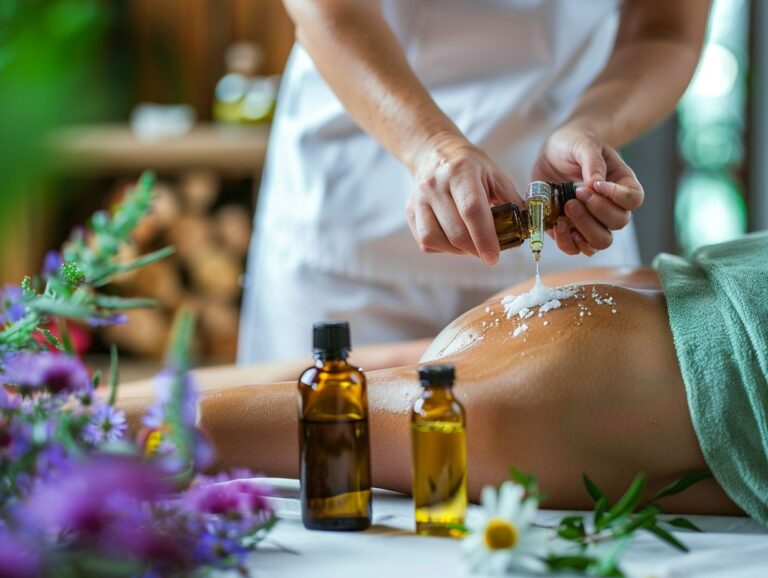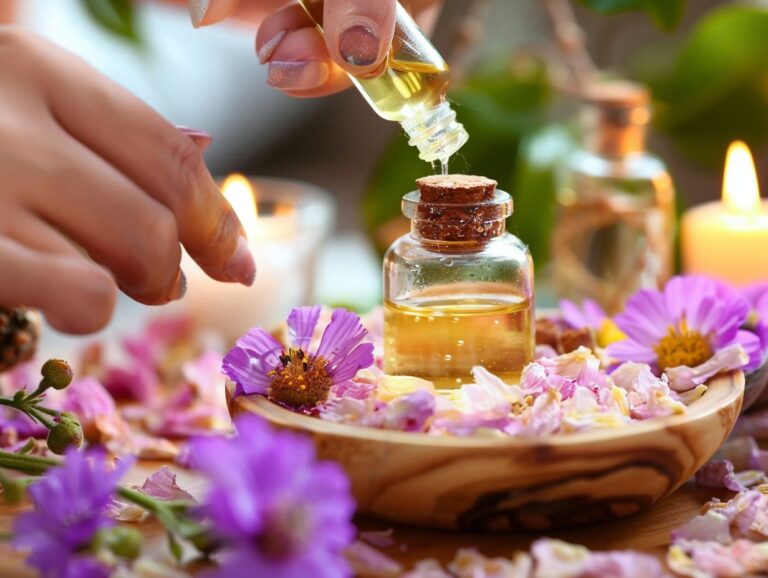What is Rosemary Aromatherapy Good for
Rosemary aromatherapy is a natural and holistic approach to health and wellness that harnesses the therapeutic benefits of rosemary essential oil.
We will explore the various benefits of what rose aromatherapy does, including stress relief, improved memory and concentration, pain reduction, and immune system support.
We will also discuss the different methods of using rosemary essential oil, safety considerations, and tips for choosing a high-quality oil.
Whether you’re new to aromatherapy or a seasoned enthusiast, this article will provide valuable insights into the world of rosemary aromatherapy.
Key Takeaways:
What is Rosemary Aromatherapy?
Rosemary aromatherapy involves the use of rosemary oil, extracted from the Rosmarinus officinalis plant, as an essential oil in aroma therapy practices to promote health and well-being.
This aromatic therapy has been traced back to ancient civilizations like the Egyptians, Romans, and Greeks, who revered rosemary for its medicinal properties. The concept of using rosemary in wellness practices is based on the belief that its fragrance and properties can positively impact both the body and mind.
How is Rosemary Aromatherapy Performed?
Rosemary aromatherapy is performed by using rosemary oil in various aroma therapy techniques, such as inhalation or topical application, to harness its potential health benefits.
Rosemary oil is a versatile essential oil known for its numerous health benefits and stimulating aroma. Inhalation, one of the common methods of rosemary aromatherapy, involves adding a few drops of rosemary oil to a diffuser or inhaling it directly from the bottle. When inhaled, the aromatic compounds of rosemary oil are believed to stimulate the olfactory system, promoting a sense of relaxation and mental clarity. On the other hand, topical application involves diluting rosemary oil with a carrier oil and massaging it onto the skin, often used for its potential soothing and rejuvenating effects.
What Are the Benefits of Rosemary Aromatherapy?
Rosemary aromatherapy offers a range of benefits, including improved cognitive function, pain relief, anti-inflammatory properties, antioxidant effects, and potential support for conditions like Alzheimer’s disease, hair growth, autoimmune issues, skin health, and circulation.
One of the key advantages of rosemary aromatherapy is its ability to enhance cognitive function, where the refreshing scent of rosemary can help improve memory, focus, and overall mental clarity. The anti-inflammatory properties of rosemary essential oil make it a popular choice for managing pain and reducing swelling in conditions like arthritis. This natural remedy also boasts antioxidant effects, combating free radicals and promoting healthy cell regeneration. Rosemary aromatherapy has shown promise in supporting individuals dealing with specific conditions such as Alzheimer’s disease, where it may aid in memory retention and cognitive functioning.
Relieves Stress and Anxiety
Rosemary aromatherapy is known for its ability to relieve stress and anxiety through the calming effects of the essential oils when used in aroma therapy practices.
When the scent of rosemary essential oil is inhaled, it can stimulate the limbic system in the brain, which plays a role in emotions and memory. This stimulation can help release feelings of tension and promote relaxation. In addition, the anti-inflammatory and antioxidant properties of rosemary oil can also contribute to reducing stress levels in the body. Incorporating rosemary aromatherapy into your daily routine, whether through diffusers, massage oils, or baths, can provide a natural and holistic way to manage stress and anxiety.
Improves Memory and Concentration
One of the key benefits of rosemary aromatherapy is its ability to enhance memory and concentration due to its positive impact on cognitive processes and neurological properties.
Rosemary essential oil, commonly used in aromatherapy, contains compounds like 1,8-cineole that have been linked to improved memory retention and mental alertness.
Studies suggest that inhaling the scent of rosemary can stimulate brain activity, leading to enhanced focus and cognitive function.
The aromatic properties of rosemary may help reduce mental fatigue and boost overall brain function, making it a valuable tool for individuals seeking to improve their memory and concentration levels.
Reduces Pain and Inflammation

When rosemary essential oil is inhaled, it triggers a response in the brain that releases neurotransmitters like serotonin and endorphins, known for their pain-relieving effects. Through this mechanism, rosemary aroma can help alleviate both acute and chronic pain. Moreover, rosemary contains compounds like carnosol and rosmarinic acid that inhibit inflammatory enzymes and cytokines, reducing swelling and pain associated with inflammation.
Along with its anti-inflammatory effects, rosemary has antioxidant properties that neutralize free radicals, further diminishing tissue damage caused by inflammation. By modulating the body’s response to pain and inflammation, rosemary aromatherapy offers a holistic approach to managing various conditions, from arthritis to muscle soreness.
Boosts Immune System
Rosemary aromatherapy can strengthen the immune system, aiding in the defense against respiratory infections and supporting conditions related to autoimmune issues through its positive effects on immune responses and white blood cells.
Research has shown that the active compounds in rosemary essential oil can stimulate the production of white blood cells, which play a vital role in the body’s defense system. By enhancing immune responses, rosemary aromatherapy helps the body to combat pathogens and viruses that can lead to respiratory infections. The anti-inflammatory properties of rosemary can be beneficial in managing autoimmune conditions by reducing inflammation and supporting overall immune function.
What Are the Different Ways to Use Rosemary Aromatherapy?
Rosemary aromatherapy can be experienced through various methods, including inhalation, topical application, and aromatherapy massages, allowing for versatile and effective usage of rosemary oil.
When inhaling rosemary essential oil, its aromatic compounds can directly affect the brain, improving mood, concentration, and reducing stress. On the other hand, topical application of this oil can provide relief for muscle aches, joint pains, and even help with skincare due to its anti-inflammatory and antimicrobial properties. Aromatherapy massages, incorporating rosemary oil, not only offer relaxation and stress relief but also promote mental clarity and boost circulation through the combined effects of touch and scent.
Inhalation
Inhalation is a popular method for utilizing rosemary oil in aromatherapy practices, especially through the use of aromatherapy diffusers, which can help in respiratory issues and infections.
When rosemary oil is diffused into the air, it releases potent compounds such as camphor, cineole, and pinene, known for their antimicrobial properties.
These properties may help in clearing the respiratory tract, easing congestion, and promoting easier breathing, making it a natural remedy for respiratory concerns.
Inhaling rosemary oil through diffusers is a convenient and effective way to reap these benefits, especially during cold and flu season when respiratory infections are more prevalent.
Topical Application
Topical application of rosemary oil is beneficial for skin health and hair growth, especially when combined with a carrier oil to target hair follicles and improve overall skin condition.
Rosemary oil is rich in antioxidants and anti-inflammatory properties, making it a popular choice for skincare routines. When applied topically, it can help reduce inflammation, redness, and acne breakouts, promoting a clearer complexion.
For hair growth, rosemary oil stimulates blood circulation in the scalp, encouraging hair follicles to produce stronger, healthier strands. Mixing rosemary oil with a carrier oil such as coconut or jojoba oil enhances its benefits, as carrier oils provide nourishment and hydration to the scalp and hair.
Aromatherapy Massage
Aromatherapy massages with rosemary oil can promote better circulation, blood flow, and the release of hormone-like lipids, enhancing the overall health benefits of the massage experience.
Rosemary oil is known for its stimulating properties that can invigorate the senses and improve mental clarity, adding a refreshing element to the calming effects of the massage. Through its aromatic compounds, it can also help reduce stress and anxiety, making the massage session more relaxing and therapeutic. The antimicrobial properties of rosemary oil can contribute to skin health, keeping the skin nourished and protected during the massage.
Is Rosemary Aromatherapy Safe?

Rosemary essential oil is widely used in aromatherapy for its stimulating and invigorating properties, often promoting mental clarity and focus. When inhaled, it can also help alleviate respiratory issues like congestion and cough.
It is crucial to dilute rosemary essential oils properly as its potent nature can lead to skin sensitivities. It is advised to perform a patch test before applying diluted rosemary oil topically to avoid adverse reactions.
In some cases, excessive use of rosemary oil may cause headaches or dizziness, especially for individuals with sensitive skin or respiratory conditions, highlighting the importance of moderation in aromatherapy practices.
Possible Side Effects
Potential side effects of rosemary oil in aromatherapy may include skin irritation, allergic reactions, and impacts on the quality of life for some individuals, necessitating careful consideration and consultation with a healthcare provider.
Skin irritation from rosemary oil can manifest as redness, itching, or a rash, which might become uncomfortable and bothersome over time. Allergic reactions, though rare, could include symptoms like swelling, hives, or difficulty breathing, requiring immediate medical attention. These effects may disrupt daily activities and sleep patterns, leading to stress and frustration. It is crucial not to dismiss any adverse reactions and seek professional guidance promptly to mitigate any potential risks or discomfort.
Precautions for Pregnant Women and Children
Special precautions are advised for pregnant women and children when considering the use of rosemary oil in aromatherapy, requiring guidance from a healthcare provider due to the potency and effects of essential oils on these sensitive populations.
During pregnancy, it’s crucial to consult with a medical professional before incorporating any essential oils into your routine. Rosemary oil specifically might stimulate contractions and potentially pose risks if used inappropriately. For young children, the concentration of essential oils can be overwhelming and may trigger adverse reactions if not properly diluted or administered under expert supervision.
Healthcare providers can provide tailored advice on the safe application and dosage of rosemary aromatherapy for pregnant women and children, bearing in mind potential allergies, sensitivities, and interactions with existing medications.
How to Choose Quality Rosemary Essential Oil for Aromatherapy?
Selecting high-quality rosemary essential oil for aromatherapy involves looking for purity, organic certifications, and reviewing testimonials to ensure the best choice for optimal aromatherapy benefits.
Regarding purity, a reputable supplier will offer oils that are 100% pure and free from any additives or synthetic ingredients. Look for oils that are extracted using methods that preserve the integrity of the plant’s natural compounds.
Organic certifications ensure that the rosemary oil has been cultivated without the use of harmful pesticides or chemicals, resulting in a cleaner and more environmentally friendly product.
Customer testimonials provide valuable insights into the quality and efficacy of the essential oil. Reading reviews from other users can help you gauge the overall satisfaction and results experienced by people who have used the product.
Look for Pure and Organic Oils
When choosing rosemary essential oil, prioritize pure and organic options to ensure the absence of harmful additives and to verify certifications that guarantee the quality and authenticity of the essential oils.
Opting for pure and organic rosemary essential oils not only enhances the benefits derived from the oil but also supports sustainable and eco-friendly practices. The process of extraction in certified organic oils often involves carefully monitoring the growth and processing of the plant to ensure a high-quality end product.
Certifications such as USDA Organic, ECOCERT, or Soil Association provide consumers with the assurance that the essential oil has met stringent standards and complies with organic farming practices that eschew synthetic pesticides or fertilizers.
Check for Certifications
Certifications play a crucial role in verifying the quality and purity of rosemary essential oils, ensuring that they meet the required standards for efficacy and safety, particularly concerning skin health benefits.
Regarding choosing a rosemary essential oil for skincare, consumers often rely on certifications to guarantee they are investing in a high-quality product. These certifications serve as a stamp of approval, indicating that the oil has undergone rigorous testing and meets industry standards for potency and purity. Organic certifications, for instance, provide assurance that the oil is free from harmful pesticides and chemicals, making it ideal for sensitive skin types. Certifications also attest to the sustainability and ethical practices employed in the production of the oil, ensuring a more environmentally friendly choice.
Read Reviews and Testimonials

Feedback and testimonials are invaluable resources when choosing rosemary essential oils. They provide insights into real experiences, allowing you to make a more informed decision. By looking into reviews, you can understand how the oil has worked for others, particularly in enhancing hair growth and addressing various skincare concerns. Customers often share detailed accounts of their results, shedding light on the efficacy and quality of the product.
Frequently Asked Questions
What is Rosemary Aromatherapy Good for?
Rosemary aromatherapy is good for a variety of purposes, including improving memory and concentration, relieving stress and anxiety, promoting hair growth, and boosting the immune system.
How does Rosemary Aromatherapy work?
Rosemary essential oil contains compounds that have been found to have a positive effect on the brain, helping to improve memory and concentration. It also has calming properties that help to relieve stress and anxiety.
Can Rosemary Aromatherapy help with hair growth?
Yes, rosemary essential oil has been shown to stimulate hair growth by increasing blood circulation to the scalp, which promotes healthy hair follicles. It also has antiseptic properties that can help to prevent dandruff and other scalp conditions.
What other benefits does Rosemary Aromatherapy offer?
In addition to its effects on memory, concentration, and hair growth, rosemary aromatherapy has been found to have antioxidant and anti-inflammatory properties, which may have a positive impact on overall health and well-being.
Are there any precautions to take when using Rosemary Aromatherapy?
While generally safe, it is important to dilute rosemary essential oil before using it in aromatherapy, as it can be irritating to the skin when used undiluted. Pregnant women and children should also consult with a healthcare professional before using rosemary aromatherapy.
How can I incorporate Rosemary Aromatherapy into my daily routine?
There are several ways to use rosemary essential oil for aromatherapy, including diffusing it in a room, adding a few drops to a bath, or applying it topically when diluted with a carrier oil. Experiment to find the method that works best for you and your needs.








One Comment